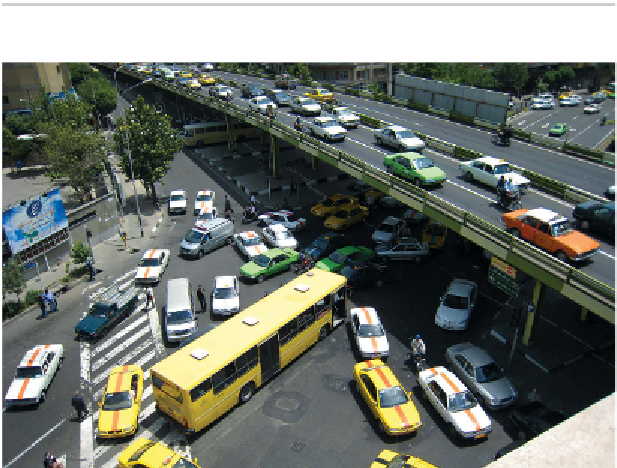Travel Reference
In-Depth Information
Adding to the chaotic trai c mix are pedestrians, doing their best to
navigate the wild streets. Locals joke that when you set out to cross a big
street, you “go to Chechnya.” I was told that Iran loses more than 30,000
people on the roads each year (in cars and on foot).
While in Tehran, we were zipped smoothly around by Majid, our driver.
Majid navigated our eight-seater bus like a motor scooter, weaving in and out
of trai c that stayed in its lanes like rocks in a landslide. To illustrate how
clueless I was in Iran, for three days I called him “Najaf.” And whenever a bit
of i lming went well and we triumphantly returned to the car, I gave him an
enthusiastic thumbs-up. But i nally Majid patiently explained that I'd been
confusing his name with a city in Iraq...and that giving someone a thumbs-up
in Iran is like giving them the i nger.
While trai c is enough to make you scream, people are incredibly good-
humored on the road. I never heard angry horns honking. While stalled in a
Tehran jam, people in a neighboring car saw me sitting patiently in the back
of our van: a foreigner stuck in their trai c. h ey rolled down their window
and handed Majid a bouquet of l owers, saying, “Give this to your visitor and
apologize for our trai c.” When the trai c jam broke up, we moved on—with
a bouquet from strangers on my lap.
But trai c can be aggravating, too. Later, as we struggled to drive along
a horribly congested street, Majid suddenly declared, “Death to trai c .” h is
outburst caught my attention. I said, “I thought it was 'Death to America.'”
He explained, “Here in Iran, when something frustrates us and we have no
control over it, this is what we say. 'Death to trai c. Death to…whatever.' ”
Cars merge through major intersections without trai c lights as if that's the norm.
Surprisingly...it works.















































































